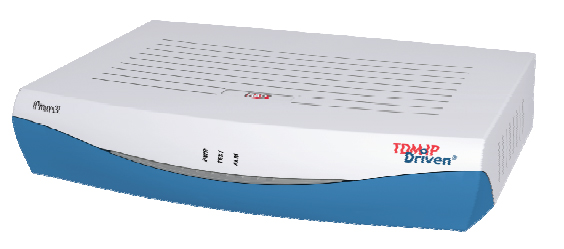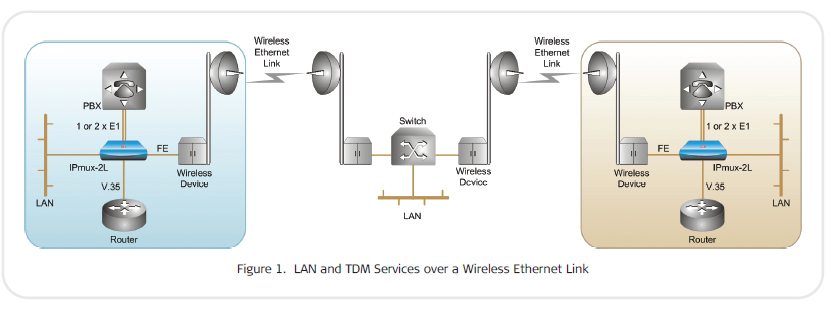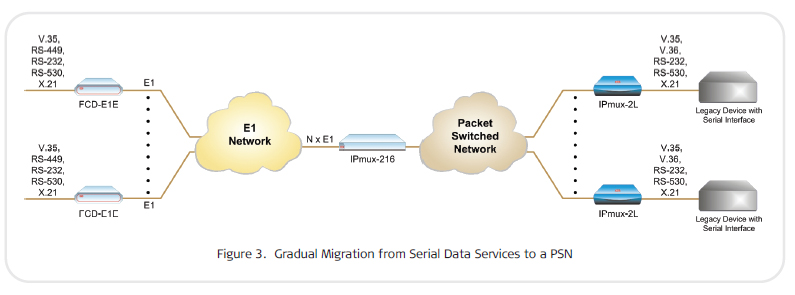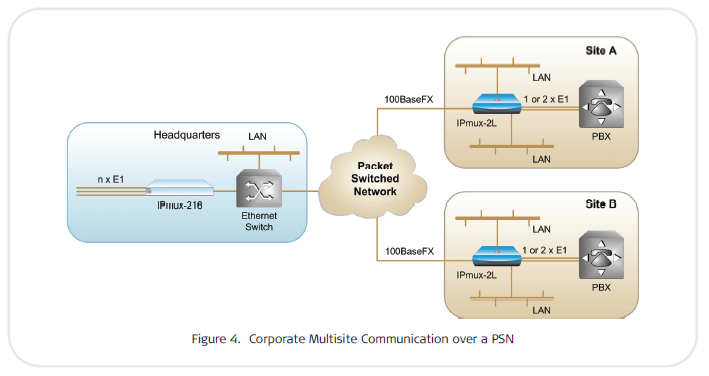




IPmux-2L TDM Pseudowire Access Gateway with serial data capabilities
IPmux-2L is a TDM pseudowire access gateway extending TDM-based services over packet switched networks. It is commonly used to transport
serial
data over IP. It also serves as an Ethernet-based access device.

RAD IPmux-2L PSEUDOWIRE PERFORMANCE
The IPmux-2L provides a legacy over PSN solution for transmitting E1 streams over
packet switched networks (PSNs). The device converts the data stream from its user E1 and high-speed data ports into
packets for transmission over the network. The addressing scheme of these packets is
IP or MPLS.
These packets are transmitted via the IPmux-2L Ethernet network port to the PSN. A remote pseudowire device converts
the packets back to TDM traffic. The ASIC-based architecture provides a robust and high performance pseudowire
solution with minimal processing delay. The RAD IPmux-2L supports various legacy over
packet transport types, including TDMoIP, CESoPSN, SAToP and HDLCoPSN. High-performance
ASIC-based buffering and forwarding techniques achieve minimal end-to-end processing delay.
Configurable packet size balances PSN throughput and delay while a jitter buffer
compensates for packet delay variation (jitter) of up to 200 msec in the network.
An assigned IANA-registered UDP port number for pseudowire simplifies flow classification through switches and
routers.
PSEUDOWIRE TIMING WITH RAD IPMUX-2L
Synchronization between TDM devices is maintained by deploying advanced clock distribution mechanisms. The clocking
options are:
Internal The IPmux-2L internal clock oscillator provides the master clock
source for the TDM circuit
Loopback The transmit clock is derived from the TDM or serial data port receive clock
Adaptive The clock is recovered from the PSN
External An external clock source synchronizes the device via its two E1
ports to input or output a 2.048 Mbps clock reference.
The system clock ensures a single clock source for all TDM links and uses master
and fallback timing sources for clock redundancy. The system also supports two different clock sources from two TDM links
at the same time.

PSEUDOWIRE QoS
IPmux-2L supports VLAN tagging and priority labeling according to 802.1p&q. Pseudowire packets are assigned a
dedicated VLAN ID and 802.1p bit. The ToS or Diffserv of the outgoing pseudowire packets are user-configurable.
This allows assigning pseudowire packets a higher priority in IP networks. EXP bits are used for QoS marking of the
TDMoMPLS traffic in MPLS networks.
TDM INTERFACE
One or two E1 ports provide connectivity to any standard E1 device. E1 interfaces feature:
Integral LTU for long haul applications
G.703 unframed and G.704 framed modes
CAS and CRC-4 bit generation (E1).

IPMUX-2L SERIAL INTERFACE AVAILABLE
A data port is available for an N Χ 64 kbps serial connection to legacy equipment.
Provided via 25-pin D-type connector, the serial port supports the following interfaces:
X.21
V.24/RS-232
RS-530/RS-422
V.35
V.36/RS-449.
DCE/DTE modes are selected via adapter cables and IPmux-2L clock configuration.
ETHERNET INTERFACE
IPmux-2L includes the following Ethernet ports:
One network port (copper or fiber optic)
Two user ports (both copper, or one copper and one fiber optic).
The network and user ports support auto-negotiation, VLAN tagging and rate limiting.
ETHERNET CAPABILITIES
An internal Layer-2 Ethernet switch of IPmux-2L includes three Ethernet ports. One port serves as a network interface
and the other two serve for user Ethernet traffic.

Each Ethernet port features:
Port-based rate limiting for bandwidth control
Four priority queues (strict or weighted) for handling traffic with different service demands. Traffic is
classified according to IP Precedence, 802.1P, DSCP or port default priority.
Port-based VLAN membership for ingress traffic restriction
Port-based VLAN tagging
Double VLAN tagging (VLAN stacking)
Bridging and filtering.
The IPmux-2L supports standard IP features, such as ICMP (ping), ARP, next hop and
default gateway.
IPMUX-2L MANAGEMENT
The RAD IPmux-2L can be configured and monitored locally via an ASCII terminal, or
remotely via Telnet or Web browser. Management traffic can run over a dedicated
VLAN. Software can be downloaded via a local terminal using XMODEM/YMODEM, or remotely, using TFTP. After downloading a
new software version, IPmux-2L automatically saves the previous version in non-volatile memory for backup purposes.
Also, copies of the configuration file may be downloaded and uploaded to a remote
workstation for backup and restore purposes.
Current date and time are retrieved from a dedicated server, using SNTP.
DIAGNOSTICS
External and internal loopbacks check TDM and serial link connectivity.
A built-in internal and external BERT utility is used to monitor the TDM link quality.
The following E1 physical layer performance statistics are available: LOS, LOF, LCV, RAI, AIS, FEBE, BES, DM, ES, SES,
UAS and LOMF.
LAN and IP layer network condition statistics, such as packet loss and packet delay variation (jitter), are monitored and
stored by the device.
Fault isolation, statistics and event logging are also available.
RADs TDM PW OAM verifies connectivity and prevents pseudowire configuration mismatch.

RAD IPmux-2L data sheet (pdf)